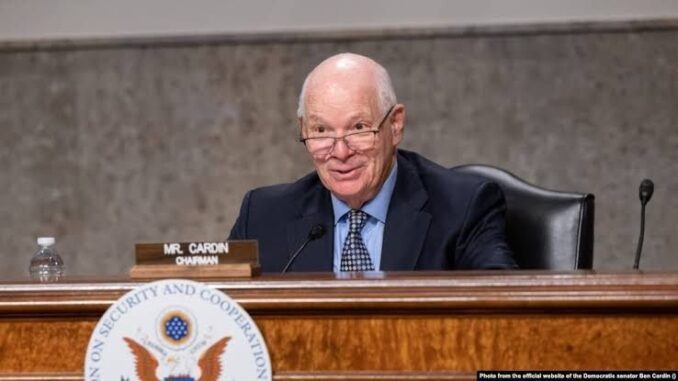
The new chairman of the Senate Foreign Relations Committee, Ben Cardin (D-Md.), has sent an important message to Egypt about its abuse of human rights, states The Washington Post in its editorial.
The senator declared he would block $235 million in foreign military assistance that the Biden administration approved only weeks ago, and that he would seek to prohibit future military aid and arms sales if Egypt “does not take concrete, meaningful and sustainable steps” to improve human rights conditions.
Egypt’s Abdel Fatah El-Sisi needs to listen. For too long, the retired general has escaped accountability for turning Egypt into a dungeon, holding tens of thousands of political prisoners and relentlessly suppressing free speech and expression.
One of the most recent cases was the unwarranted arrest and imprisonment of Hisham Kassem, a prominent democracy activist, opposition organizer and former publisher. Mr. Kassem, an advocate for independent journalism in Egypt who criticized Mr. Sisi’s military rule at a time when Egypt is in a deep economic crisis, was sentenced in September to six months in prison for libel and slander against a former cabinet minister and for verbally assaulting officers at a police station.
The case is just a sliver of the vast, decade-long assault on civil society in Egypt, which includes the use of pretrial detention to hold protesters, journalists and dissidents for long periods without ever initiating formal charges.
Mr. Sisi presides over a rotating system of rights violations, in which he releases some of those imprisoned and then arrests more. He has also attempted to whitewash the continuing repression by announcing a “National Dialogue” with the opposition that activists say has excluded any discussion of human rights.
Under law, $320 million of U.S. foreign military aid to Egypt is conditioned on improvement in its human rights record. The criteria include: protecting “freedoms of expression, association, and peaceful assembly”; allowing independent media, civil society and human rights defenders “to function without interference”; and “releasing political prisoners and providing detainees with due process of law.”
The Biden administration said Sept. 14 it would issue a national security waiver allowing Egypt to receive $235 million of the conditioned aid, withholding only $85 million. The announcement Saturday by Mr. Cardin, and a parallel statement by Gregory Meeks (N.Y.), the ranking Democratic member on the House Foreign Affairs Committee, effectively blocks the $320 million. Overall, Egypt receives $1.3 billion a year from the United States, one of the largest U.S. aid recipients.
Mr. Cardin’s actions also come just as Egypt has been implicated in a brazen alleged U.S. political corruption scheme. Mr. Cardin took over the Senate committee chair from Sen. Bob Menendez (D-N.J.), who stepped down following Mr. Menendez’s indictment on bribery charges.
The charging documents suggest that Egypt sought Mr. Menendez’s help in exchange for payoffs such as “hundreds of thousands of dollars in checks, cash, and gold.” In return, according to the indictment, Mr. Menendez agreed to use his clout to push for Egyptian military aid from the United States.
Also, the senator allegedly passed to Egypt “highly sensitive” information about the makeup of the U.S. Embassy in Cairo; gave Egypt information about U.S. arms sales decisions; and “secretly edited and ghostwrote” a “requested letter on behalf of Egypt seeking to convince other U.S. Senators to release a hold on $300 million in aid to Egypt.”
These allegations describe an attempt by Egypt to corrupt the U.S. legislative process. It is insulting for American taxpayers to discover that Egypt, rewarded since 1978 with more than $50 billion in military and $30 billion in economic assistance, has allegedly been attempting to subvert a key aspect of U.S. democracy with tawdry bribes.
These events demand that Egypt hold to account those officials potentially involved in the alleged dirty deals and provide a thorough public accounting to the United States.
But that alone would not be enough to justify freeing the money Mr. Cardin froze. Egypt’s leaders have for too long violated their people’s human rights, terrorized their opposition and assaulted the independent media.



